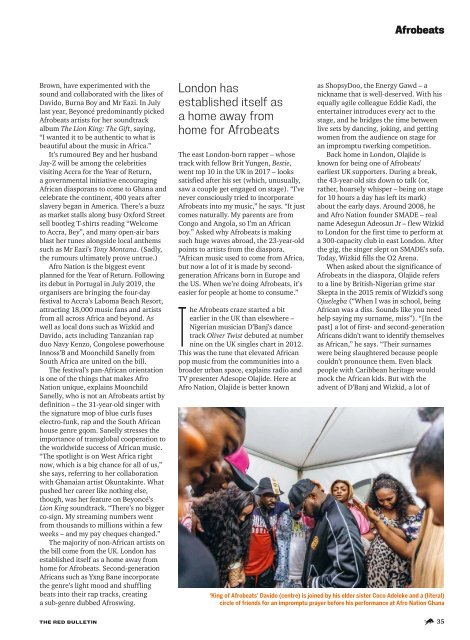Create successful ePaper yourself
Turn your PDF publications into a flip-book with our unique Google optimized e-Paper software.
Afrobeats<br />
Brown, have experimented with the<br />
sound and collaborated with the likes of<br />
Davido, Burna Boy and Mr Eazi. In July<br />
last year, Beyoncé predominantly picked<br />
Afrobeats artists for her soundtrack<br />
album <strong>The</strong> Lion King: <strong>The</strong> Gift, saying,<br />
“I wanted it to be authentic to what is<br />
beautiful about the music in Africa.”<br />
It’s rumoured Bey and her husband<br />
Jay-Z will be among the celebrities<br />
visiting Accra for the Year of Return,<br />
a governmental initiative encouraging<br />
African diasporans to come to Ghana and<br />
celebrate the continent, 400 years after<br />
slavery began in America. <strong>The</strong>re’s a buzz<br />
as market stalls along busy Oxford Street<br />
sell bootleg T-shirts reading “Welcome<br />
to Accra, Bey”, and many open-air bars<br />
blast her tunes alongside local anthems<br />
such as Mr Eazi’s Tony Montana. (Sadly,<br />
the rumours ultimately prove untrue.)<br />
Afro Nation is the biggest event<br />
planned for the Year of Return. Following<br />
its debut in Portugal in July 2019, the<br />
organisers are bringing the four-day<br />
festival to Accra’s Laboma Beach Resort,<br />
attracting 18,000 music fans and artists<br />
from all across Africa and beyond. As<br />
well as local dons such as Wizkid and<br />
Davido, acts including Tanzanian rap<br />
duo Navy Kenzo, Congolese powerhouse<br />
Innoss’B and Moonchild Sanelly from<br />
South Africa are united on the bill.<br />
<strong>The</strong> festival’s pan-African orientation<br />
is one of the things that makes Afro<br />
Nation unique, explains Moonchild<br />
Sanelly, who is not an Afrobeats artist by<br />
definition – the 31-year-old singer with<br />
the signature mop of blue curls fuses<br />
electro-funk, rap and the South African<br />
house genre gqom. Sanelly stresses the<br />
importance of transglobal cooperation to<br />
the worldwide success of African music.<br />
“<strong>The</strong> spotlight is on West Africa right<br />
now, which is a big chance for all of us,”<br />
she says, referring to her collaboration<br />
with Ghanaian artist Okuntakinte. What<br />
pushed her career like nothing else,<br />
though, was her feature on Beyoncé’s<br />
Lion King soundtrack. “<strong>The</strong>re’s no bigger<br />
co-sign. My streaming numbers went<br />
from thousands to millions within a few<br />
weeks – and my pay cheques changed.”<br />
<strong>The</strong> majority of non-African artists on<br />
the bill come from the UK. London has<br />
established itself as a home away from<br />
home for Afrobeats. Second-generation<br />
Africans such as Yxng Bane incorporate<br />
the genre’s light mood and shuffling<br />
beats into their rap tracks, creating<br />
a sub-genre dubbed Afroswing.<br />
London has<br />
established itself as<br />
a home away from<br />
home for Afrobeats<br />
<strong>The</strong> east London-born rapper – whose<br />
track with fellow Brit Yungen, Bestie,<br />
went top 10 in the UK in 2017 – looks<br />
satisfied after his set (which, unusually,<br />
saw a couple get engaged on stage). “I’ve<br />
never consciously tried to incorporate<br />
Afrobeats into my music,” he says. “It just<br />
comes naturally. My parents are from<br />
Congo and Angola, so I’m an African<br />
boy.” Asked why Afrobeats is making<br />
such huge waves abroad, the 23-year-old<br />
points to artists from the diaspora.<br />
“African music used to come from Africa,<br />
but now a lot of it is made by secondgeneration<br />
Africans born in Europe and<br />
the US. When we’re doing Afrobeats, it’s<br />
easier for people at home to consume.”<br />
<strong>The</strong> Afrobeats craze started a bit<br />
earlier in the UK than elsewhere –<br />
Nigerian musician D’Banj’s dance<br />
track Oliver Twist debuted at number<br />
nine on the UK singles chart in 2012.<br />
This was the tune that elevated African<br />
pop music from the communities into a<br />
broader urban space, explains radio and<br />
TV presenter Adesope Olajide. Here at<br />
Afro Nation, Olajide is better known<br />
as ShopsyDoo, the Energy Gawd – a<br />
nickname that is well-deserved. With his<br />
equally agile colleague Eddie Kadi, the<br />
entertainer introduces every act to the<br />
stage, and he bridges the time between<br />
live sets by dancing, joking, and getting<br />
women from the audience on stage for<br />
an impromptu twerking competition.<br />
Back home in London, Olajide is<br />
known for being one of Afrobeats’<br />
earliest UK supporters. During a break,<br />
the 43-year-old sits down to talk (or,<br />
rather, hoarsely whisper – being on stage<br />
for 10 hours a day has left its mark)<br />
about the early days. Around 2008, he<br />
and Afro Nation founder SMADE – real<br />
name Adesegun Adeosun Jr – flew Wizkid<br />
to London for the first time to perform at<br />
a 300-capacity club in east London. After<br />
the gig, the singer slept on SMADE’s sofa.<br />
Today, Wizkid fills the O2 Arena.<br />
When asked about the significance of<br />
Afrobeats in the diaspora, Olajide refers<br />
to a line by British-Nigerian grime star<br />
Skepta in the 2015 remix of Wizkid’s song<br />
Ojuelegba (“When I was in school, being<br />
African was a diss. Sounds like you need<br />
help saying my surname, miss”). “[In the<br />
past] a lot of first- and second-generation<br />
Africans didn’t want to identify themselves<br />
as African,” he says. “<strong>The</strong>ir surnames<br />
were being slaughtered because people<br />
couldn’t pronounce them. Even black<br />
people with Caribbean heritage would<br />
mock the African kids. But with the<br />
advent of D’Banj and Wizkid, a lot of<br />
‘King of Afrobeats’ Davido (centre) is joined by his elder sister Coco Adeleke and a (literal)<br />
circle of friends for an impromptu prayer before his performance at Afro Nation Ghana<br />
THE RED BULLETIN 35

















